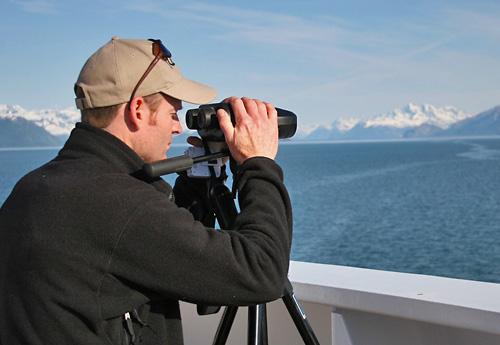Autumn 2012–
Winter 2013

Photo courtesy of Noble Hendrix.
Alumni Feature
Noble Hendrix
MS, UW, Aquatic and Fishery Sciences, 2000
PhD, UW, Aquatic and Fishery Sciences, 2003
Crayfish (Procambarus spp.) response to hydrologic restoration of the Florida Everglades
Noble Hendrix grew up in Miami, Florida. He developed his affinity for aquatic environments at a young age, when his father started taking him and his brother fishing, first in mangrove channels and canals, and later offshore.
Noble attended Duke University for his undergraduate program. He recalled a highlight from his time at the Duke Marine Lab: “One spring semester, we were able to run all over Piver’s Island catching animals, bringing them into the lab, getting a good look at them, and then letting them go.” This was also when Noble discovered the joys of experimental design, data collection, and data analysis.
While looking for a graduate program on the West Coast, he came to Seattle and “spent an August riding bikes around town, making several climbing trips in the Olympics, and enjoying one of those spectacular Seattle summers.” That was it—he decided to stay in Seattle and try to enroll in the [then] School of Fisheries graduate program.
He initially volunteered to work with a toxicology group at NMFS while working as a barista; Noble quipped “I was making lattes to support an ecology habit!” This led to a project with Professor Frieda Taub, comparing zooplankton assemblages in Florida and Wisconsin. On applying for the SAFS graduate program, Noble received an Achievement Reward for College Scientists (ARCS) award.
For his MS program, Noble studied the habitat requirements of crayfish in the Everglades (David Armstrong, adviser). Noble reflected that, “the process of putting together a proposal for the project, developing the budget, organizing the schedule, and providing the deliverables was a particularly valuable experience.”
Towards the end of his MS studies, Noble was faced with two options for a PhD focus: crayfish ecology in the Everglades, or mathematical models of crayfish population dynamics. He chose the latter to enhance his skill set, stay in Seattle, and study with Professor Ray Hilborn. He related what he described as a “geek’s confession”: “I’ll never forget spending an entire afternoon (one of many) in the computer lab and finally grasping the concept of estimating the coefficients of a model using maximum likelihood.”
After earning his PhD, he joined R2 Resource Consultants, Inc., a small consulting firm specializing in fisheries-related issues. Noble observed that he continues to apply what he learned at UW/SAFS on the job. He emphasized the importance of quantitative skills: “There continues to be a need for this—it was true when I finished almost a decade ago, and it is still true now.”
And sometimes there’s a bonus: Noble related a situation where he gave a practical demonstration to a client on how one can fit models to data. When the client saw the result, he said, “It’s magic!”
Recently, he has been working in southeast Alaska, evaluating the potential for cruise ship traffic to affect populations of humpback whales. This project was initiated by one of his SAFS classmates, Scott Gende (2003 PhD with Tom Quinn), who works for the National Park Service.
Noble exemplifies how SAFS alumni have found success in areas besides academia and government.
Noble mentioned the value of his SAFS fellowships: about a year into his Master’s program, SAFS provided some bridging support through a VanCleve Fellowship that allowed him to “find” David Armstrong and develop the proposal that would eventually lead to his PhD.
Noble is a SAFS Affiliate Assistant Professor and enjoys serving on graduate committees and sharing his knowledge of Bayesian methods in classes such as FISH 558 and 559. He continues to collaborate with Professors Hilborn and André Punt. You can often see Noble at the Friday Quantitative Seminars and the UW–NOAA Think Tank series.
